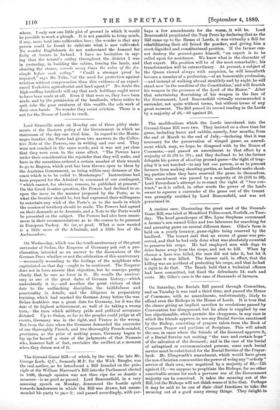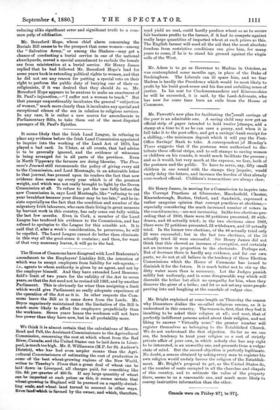On Saturday, the Burials Bill passed through Committee, and on
Tuesday it was read a third time, and passed the House of Commons, with no amendments, unfortunately, likely to offend even the Bishops in the House of Lords. It is true that the clause giving an implicit sanction to resolutions passed by Convocation has disappeared, but its place is supplied by one less objectionable, which permits the clergyman, in any case in which the friends approve, to use any Burial Service sanctioned by the Bishop, consisting of prayers taken from the Book of Common Prayer and portions of Scripture. This will admit the use, in cases where the friends of the deceased approve it, of a Burial Service not reciting " the sure and certain hope" of the salvation of the deceased; and in the case of the burial of nnbaptised or excommunicated persons, some such burial service must be substituted for the Burial Service of the Prayer- book. Mr. Illingworth's amendment, which would have given the non-Christian communities the power of using any " orderly " service of their own, was negatived by a majority of 68,-125 against 57,—we suppose to propitiate the Bishops, for no other conceivable excuse for such a perverse use of the Government majority can be conceived. It takes the meaning out of the Bill, but the Bishops will not think worse of it for that. Perhaps it may be said to be one of their chief functions to take the meaning out of a good many strong things. They delight. in -reducing alllie significant error and significant truth to a com- mon pulp of edification.



































 Previous page
Previous page